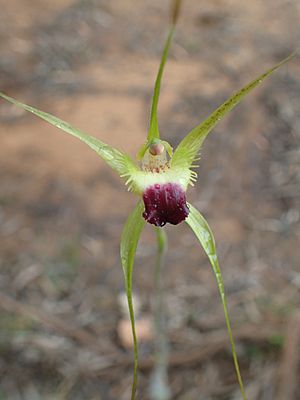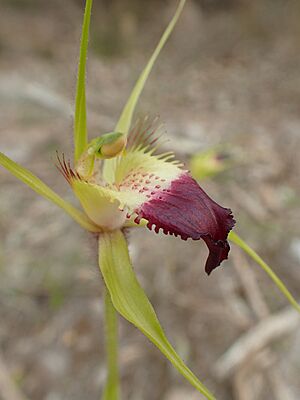Funnel-web spider orchid facts for kids
Quick facts for kids Funnel-web spider orchid |
|
|---|---|
 |
|
| Caladenia infundibularis growing near Augusta | |
| Scientific classification | |
| Genus: |
Caladenia
|
| Species: |
infundibularis
|
| Synonyms | |
|
|
The funnel-web spider orchid (scientific name: Caladenia infundibularis) is a special type of orchid. It only grows in the south-west part of Western Australia. This unique plant has a single hairy leaf and usually grows up to three greenish-yellow flowers. These flowers have a special part called a labellum that has a red tip.
What it Looks Like
The funnel-web spider orchid is a plant that grows from an underground tuber (like a small potato). It is a perennial plant, meaning it lives for more than two years. It is also deciduous, so it loses its leaves at certain times. It has one hairy leaf that is about 8 to 12 centimeters (3 to 5 inches) long and about 1.2 centimeters (0.5 inches) wide.
This orchid grows up to three greenish-yellow flowers on a stalk that can be 25 to 45 centimeters (10 to 18 inches) tall. Each flower is about 8 to 12 centimeters (3 to 5 inches) long and 6 to 8 centimeters (2 to 3 inches) wide.
The flower has several parts:
- The dorsal sepal is the top part, standing straight up. It is about 3.5 to 5.5 centimeters (1.4 to 2.2 inches) long.
- The lateral sepals are the two side parts. They are about 3.5 to 6.5 centimeters (1.4 to 2.6 inches) long. They have thin, yellowish-brown, club-like tips.
- The petals are the two parts that spread out or point slightly downwards. They are about 2.7 to 3.8 centimeters (1.1 to 1.5 inches) long.
- The labellum is the most interesting part. It is greenish-yellow with a red tip and is about 2 to 2.4 centimeters (0.8 to 0.9 inches) long. The tip of the labellum turns downwards and is shaped like a funnel. It has many spreading teeth along its sides. It also has four or six rows of yellowish bumps called calli along its middle.
These orchids usually bloom, or flower, in October and November.
How it Got its Name
The funnel-web spider orchid was officially described for the first time in 1984 by a scientist named Alex George. He wrote about it in a journal called Nuytsia. He found the plant near a town called Augusta.
The scientific name infundibularis comes from a Latin word. It means "funnel-shaped." This name was chosen because the base of the orchid's labellum (the special lip part of the flower) looks like a funnel.
Where it Grows
The funnel-web spider orchid lives in the south-west part of Western Australia. You can find it in an area stretching between Dunsborough and Northcliffe.
It grows in different types of places:
- Coastal heath: Areas with low-growing shrubs near the coast.
- Forest: Areas with many trees, like the Jarrah Forest.
- Woodland: Areas with trees that are more spread out than in a forest.
It is found in specific natural regions of Western Australia, including the Jarrah Forest, Swan Coastal Plain, and Warren areas.
Is it Safe?
Good news! The Western Australian Government's Department of Parks and Wildlife has classified the funnel-web spider orchid as "Not Threatened." This means that, for now, there are enough of these orchids, and they are not in danger of disappearing.


